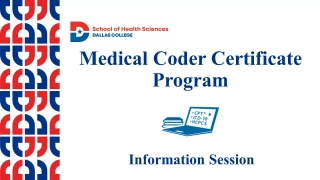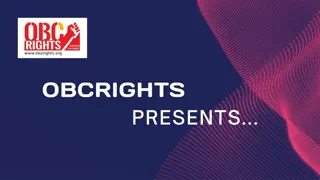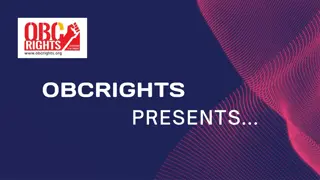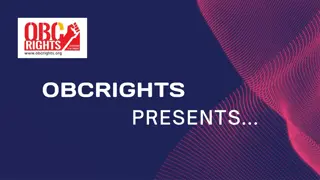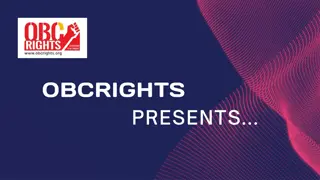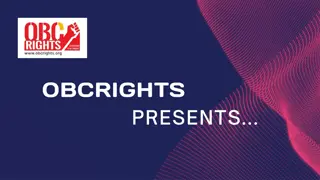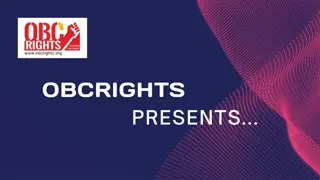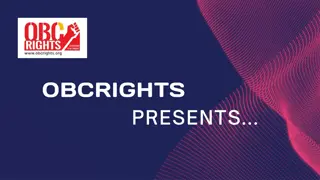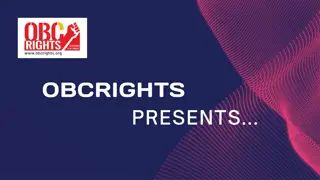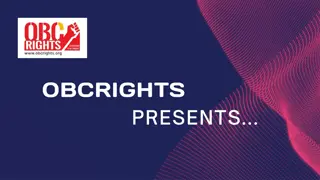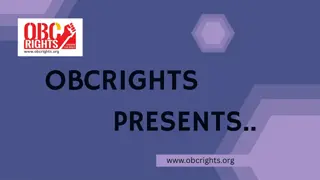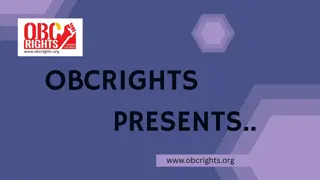Medical Coding Certificate Program Information Session
Medical coding is the process of assigning codes to healthcare documentation for tracking and statistical purposes. Learn about the role of a medical coder, job outlook, and entry-level titles in the field. Discover if medical coding is a good career choice and the opportunities it offers in various healthcare settings.
Download Presentation

Please find below an Image/Link to download the presentation.
The content on the website is provided AS IS for your information and personal use only. It may not be sold, licensed, or shared on other websites without obtaining consent from the author. Download presentation by click this link. If you encounter any issues during the download, it is possible that the publisher has removed the file from their server.
E N D
Presentation Transcript
Medical Coder Certificate Program Information Session
Medical Coder Certificate Getting Started Thank you for your interest in the School of Health Sciences Medical Coder Certificate program. This information session is designed to answer many of your questions. Please download the program information packet and read it thoroughly for complete details regarding the application requirements and other information on this health science program. Your completion of this information session is the beginning of your application into the program and the questionnaire that follows will serve as a record of attendance.
What is Medical Coding Every time a patient receives professional health care in a physician s office, hospital facility or ambulatory surgical center, the provider must document the condition treated and the services provided. Each documented diagnosis and procedure performed is assigned a numeric or alphanumeric code, which corresponds to the ICD-10 and/or CPT classification systems. These are known as medical codes. Medical coding is the process of analyzing healthcare documentation and assigning medical codes using a classification system. Information from medical coding is also used for statistics and tracking illnesses and diseases.
What Does A Medical Coder Do? Uses knowledge of medical terminology, anatomy and physiology, diseases and classification systems to assign a diagnostic or procedural code to a patient s medical record. Reviews medical documentation to assign medical codes and ensure the physician practices and hospitals get reimbursed from insurance companies. Communicates with other healthcare personnel to clarify diagnoses or obtain additional information. Enables insurance companies to account for money they reimburse to physicians and practices, to help prevent fraudulent medical claims or errors in payment.
Is Medical Coder A Good Career? Job Outlook according to the Bureau of Labor Statistics: Overall employment of medical records and health information specialists is projected to grow 9 percent from 2020 to 2030, about as fast as the average for all occupations. About 34,300 openings for medical records and health information specialists are projected each year, on average, over the decade. Many of those openings are expected to result from the need to replace workers who transfer to different occupations or exit the labor force, such as to retire. Medical coders can find work in multiple areas, including hospitals, medical offices, billing companies, rehabilitation clinics, nursing homes and medical labs. According to a 2019 US Salary Survey Report of HIM Professionals, the average salary for 0-1 year of experience is $44,530 per year.
Medical Coding Entry-Level Titles Job listings include Medical Coder Outpatient Medical Coder Entry-Level Coding Specialist Coder I Medical Coding Associate CCA Certified Medical Coder Health Information Technician and more
Medical Coder Certifications Two professional organizations, theAmerican Health Information ManagementAssociation (AHIMA), and theAmerican Academy of Professional Coders (AAPC), offer nationally recognized medical coding certification exams. The Medical Coder Certificate program provides an opportunity for students to take the AHIMA Certified Coding Associate (CCA) exam in HITT 2246. The cost of the CCA certification exam is included in the leaning materials for this course. If they choose to sit for the exam, students can have the CCA coding certification upon completion of the program. Successful completion of the program also provides a foundation for students to prepare for the Certified Coding Specialist (CCS) and the AAPC Certified Professional Coder (CPC) exam. Note: Exams are administered by the credentialing organization at a testing center.
Medical Coder Certificate Admission Criteria (Refer to the Information Packet for more details) A high school diploma or General Education Development (GED) certificate. Completion of the Dallas College Application for Admission and acceptance. Established financial resources. Completion of this mandatory online information session and the Medical Coder Certificate program application. While no assessment testing is required for this Level I certificate (TSI waived), it is recommended you demonstrate at least a 10th grade reading level.
Medical Coder Certificate Admission Criteria Successfully complete the following prerequisites with a C or better to move to Semester I of the program POFI 1301 Computer Applications I MDCA 1313 Medical Terminology MDCA 1409 Anatomy and Physiology for Medical Assistants Students pursuing the Medical Coder Certificate who are new and/or need assistance with registration for prerequisite courses should consult with their Success Coach. Get more information about Success Coaches here.
Medical Coder Certificate Curriculum The Medical Coder Program is a college credit certificate program consisting of a total of 32 college credit hours (including the prerequisite courses). Courses are scheduled in specific sequence intentionally. Knowledge, skills, and attitudes are developed throughout each course, and they build upon each other, moving from the simple to the complex. Refer to the table of courses in the Information Packet for course sequence. During students progression through the program, registered courses for upcoming semesters are monitored. Students will be dropped from an enrolled course not taken in sequence if the requirements and course prerequisites are not met.
Tuition & Learning Materials Location Tuition per Credit Hour Learning Materials Dallas County Resident $79 Included Out-of-District $135 Included Out-of-State /International $200 Included Online textbooks will be available as part of your course learning materials. Learning materials are included in your tuition. Online textbooks will be accessible from any laptop or desktop computer.
Financial Aid and Scholarships Apply EARLY! Information about financial aid can be found at this link, Dallas College Financial Aid Information about scholarships can be found at this link, Scholarships and Other Aid
Medical Coder Certificate Checklist TO DO TASKS Acceptance into Dallas College Download Medical Coder Certificate Information Packet Complete Mandatory Online Program Information Session and Questionnaire Download and submit the program Application located on the MCC program s website Work with Success Coach to register for prerequisite program courses Welcome to the program! We re looking forward to working with you!
If you have any questions or concerns regarding the courses you should register for each term, please send a detailed email with your full name and student ID# to Sheila Baker, Medical Coder Certificate Program Coordinator at sbaker@dallascollege.edu for more information. For help with registration, contact your assigned Success Coach or contact a Success Coach advisor online here.
Thank you ! Thank you for your interest in the Medical Coder Certificate Program. You will now select the start here button below to complete a questionnaire over the information covered. Completion of the questionnaire will serve as your attendance to this information session. An email will be sent to you as well as our staff once you have completed the questionnaire. Please retain the email for your records as verification that you have attended this information session. link to form







